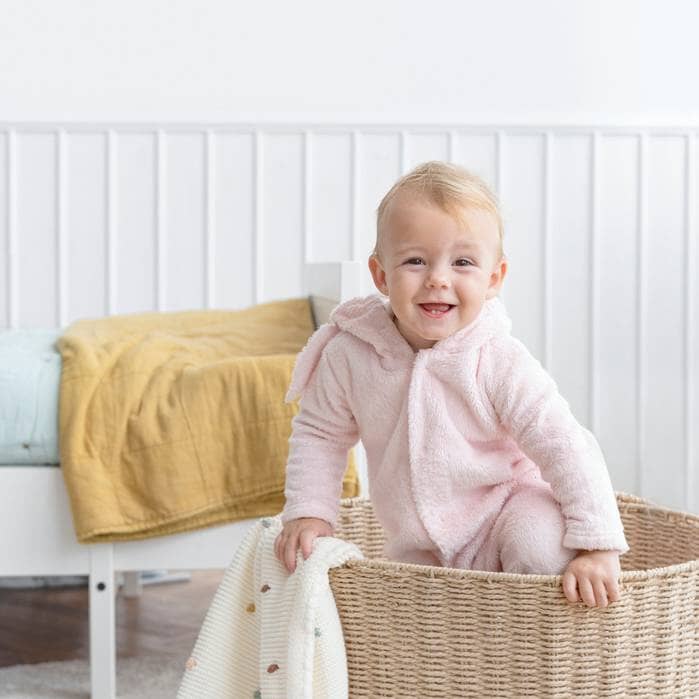Parenting a newborn is no easy task. Preparing for newborn care requires a lot of things to keep in mind. Car seats. Diaper bags. Sleep schedules. Feeding times. The list of things to prepare when a newborn arrives is never-ending.
So when the little bundle of joy makes their entrance into the world, often new moms and parents aren’t expecting a number of skin issues to arise. But the truth remains, babies have extremely sensitive skin.
A newborn’s skin is three times more sensitive than an adult’s. Their skin is still underdeveloped and sensitive to irritation and allergies.

There are a lot of common skin rashes and conditions that babies are subject to. Cradle cap, baby acne, and eczema are some of the more common ones. While you can’t always prevent rashes and irritation from happening, you can prioritize exceptional products that are meant specifically for a newborn’s sensitive skin.
Common causes of baby skin rashes and irritation
For about 40 weeks, your baby has been safely tucked inside your amniotic sac, living among its safe and chemical-free fluid. Their skin hasn’t been exposed to anything other than the safety of your womb. So when they come into the world, there are a lot of new things for this little one to be exposed to.
It’s easy to overlook some things that may impact a baby’s sensitive skin. Common laundry detergents, fabric softeners, soaps, and other everyday cleaners may do just fine with an adult’s skin, but these can be irritating for a newborn previously not exposed to them. This is why you should always use laundry detergents specifically made for your newborn’s skin.
So let’s dive into what’s normal and what should be treated when it comes to your baby’s skin issues.

Dry Skin & Cradle Cap
After a few days of living outside of the womb, baby’s skin tends to peel and crack. This is because it’s getting acclimated to the air outside of the womb. It’s extremely common and not an allergic reaction, it’s best to use shampoos and detergents that are made for your baby’s sensitive skin to avoid further complication.

Baby Acne and Milia
Another common skin issue that happens in newborns is acne and milia. Baby acnes is like adult acne in that it clusters and forms red rashes on the face and body. Milia are tiny white or skin-colored bumps on your baby’s skin that develop as well. Do not pop or pick at acne or milia.
Pediatricians and doctors differ in opinion on the cause of baby acne. Some suggest that it’s due to hormones of the mother exiting the baby’s body.

Eczema
Eczema tends to begin in babies after a few months. Eczema isn’t preventable as it's a hereditary condition, but treating eczema requires removal of common irritants like harsh soaps and detergents.
While a hereditary condition, eczema can be worsened through harsh irritants, so it’s best to avoid these and focus on products meant for sensitive skin in babies.

Infant Contact Dermatitis
Contact dermatitis is a common condition that happens when infants and babies are exposed to chemicals that irritate their skin, it is preventable.
Irritants can be anything from sunscreen, bug spray, shampoo, lotions, and laundry detergents. This is why understanding the ingredients of certain products is important before applying it to your newborn’s skin.
Preventing newborn rashes

Baby acne, eczema, and cradle cap are all very common skin rashes and issues for newborns. Irritants like everyday detergent and soap can worsen the effects of these skin conditions. Some babies may even have negative allergic reactions to such products.
Negative reactions can include contact dermatitis, a flare up of eczema, worsened baby acne, or other allergic reactions that require a doctor’s diagnosis.
In order to prevent rashes from arising or getting worse, try handwashing your baby’s clothes thoroughly. If there are traces of detergent left on your baby’s skin, it may cause further irritation that could be prevented.
Your newborn’s skin is much more sensitive than an adults. Allergic reactions could leave your infant uncomfortable, which can lead to lack of sleep, loss of appetite, and overall fussiness. All symptoms that could drive even the most patient parent crazy.

Choosing the right, safe products for your baby’s skin
Choosing the right product and baby laundry detergent for your baby’s skin can help prevent negative skin reactions and allergies from occurring. It’s always recommended to choose products that are free from harsh chemicals. Read labels carefully when choosing safe and gentle products for your baby.
Cycles offers mild, safe, and hypoallergenic products that are gentle for a baby’s sensitive skin.
When choosing products for babies, it’s always best to choose products that are:
- Clinically proven mild and hypoallergenic, which is perfect for sensitive skin
- Safe for infants and free from SLS and SLES (these are harmful chemicals often found in detergents)
- Fragrance-free detergents that don’t contain phosphates. Avoid fabric softeners, optical brighteners, bleach, dyes, enzymes, and other irritants
- Use a formula that is tested and certified by credible organizations and is proven to be within EWG standards.
- Recommended by Pediatricians
Related Articles:
A Meticulous Mom's Guide to Washing Baby Clothes



